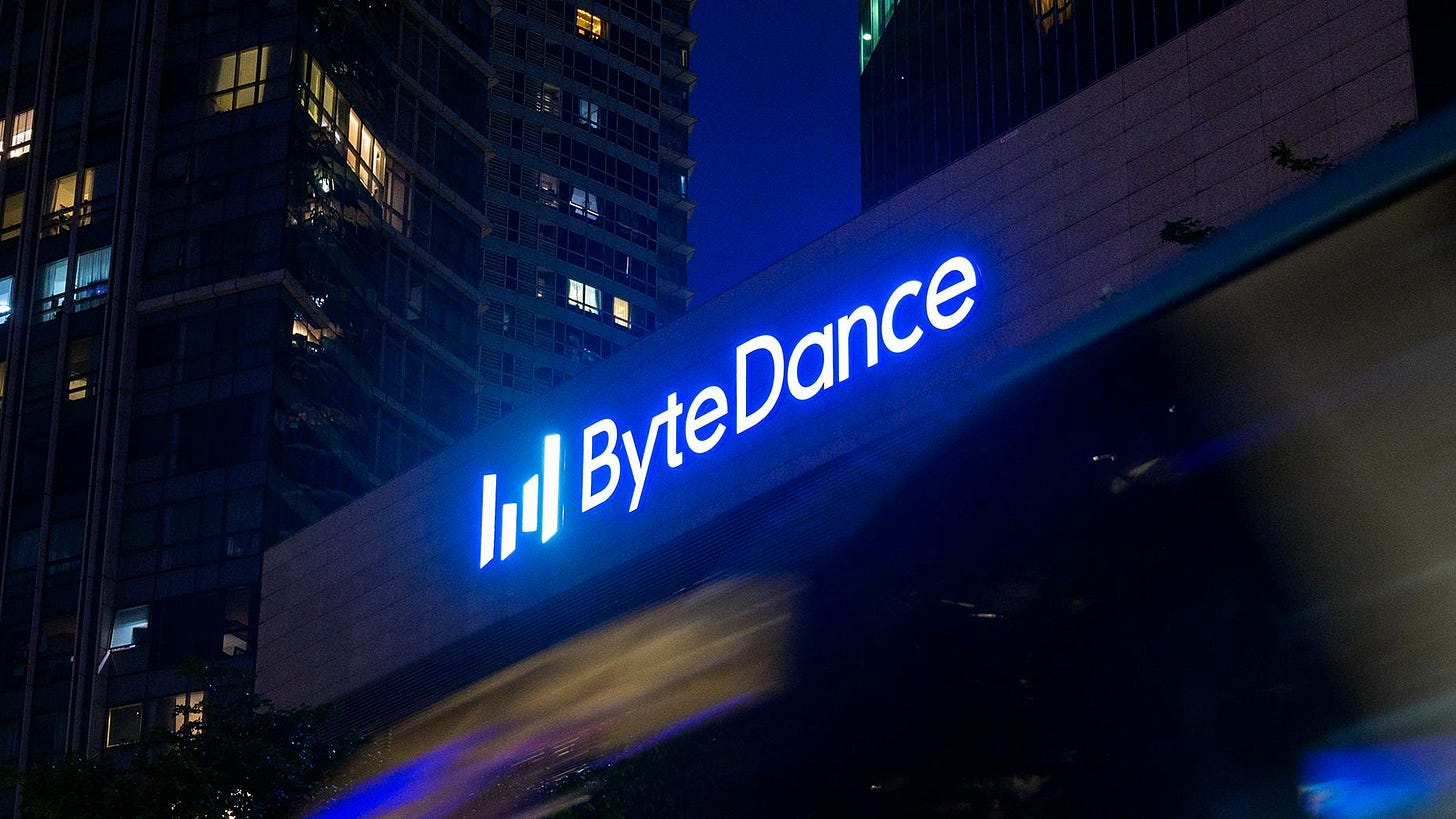🧐Is TSMC Producing Huawei’s AI Chip? ByteDance Fires Intern for Sabotaging AI, Plus IPO Frenzy Among Chinese Self-Driving Startups
Weekly China AI News from October 21, 2024 to October 27, 2024
Hi, this is Tony! Welcome to this week’s issue of Recode China AI, a newsletter for China’s trending AI news and papers.
Three things to know
U.S. is probing TSMC for potential involvement in Huawei’s AI chip supply.
Two Chinese self-driving companies, WeRide and Horizon Robotics, made high-profile IPOs last week.
ByteDance’s LLM training had been sabotaged by an intern injecting malicious code.
TSMC Under Scrutiny Over Chip Supply to Huawei
What’s New: Since the U.S. banned Huawei from buying chips manufactured using American equipment in 2020, the Chinese telecom giant has partnered with SMIC, China’s largest chip foundry, to produce chips for AI acceleration and smartphones. The widespread rollout of Huawei’s Ascend 910B and the rumored release of the next-gen 910C, comparable to Nvidia’s H100, have boosted optimism about China’s self-reliance on domestic chips.
However, a series of media reports last week suggested potential involvement by TSMC, the world’s largest chipmaker, in Huawei’s chip supply chain despite the export ban.
Tell Me More: The Information first reported that the U.S. government is probing TSMC to determine whether the company has illegally provided advanced chips, including AI and smartphone processors, to Huawei, in violation of U.S. export restrictions imposed due to national security concerns. The investigation focuses on whether TSMC indirectly sold chips to Huawei through intermediaries and if proper due diligence was followed.
Following that, the Financial Times reported that TSMC recently informed the U.S. government about a potential breach of export controls linked to AI chips requested by Huawei. This notification came after a customer placed an order for a chip resembling Huawei’s Ascend 910B. Sources indicated that while the U.S. Department of Commerce’s investigation is related to TSMC, the company itself is not currently the target of the probe. So far, there is no suggestion of intentional compliance violations on TSMC’s part.
On the same day, Bloomberg reported that Canada-based research firm TechInsights conducted a teardown of one Ascend 910B and found the chip manufactured by TSMC. Huawei responded that it has not “produced any chips via TSMC since the implementation of the U.S. Department of Commerce’s FDPR amendments targeting Huawei in 2020” and that it has never officially launched the 910B chip.
John Moolenaar, the Republican chairman of the U.S. House Committee on China, demanded answers. He said the reports that TSMC-manufactured chips contributed to Huawei’s AI development “represent a catastrophic failure of U.S. export control policy.” Congress needs immediate answers from both Commerce and TSMC.
The latest development, reported by Reuters, is that TSMC suspended shipments to China-based chip designer Sophgo after discovering that a chip it made was found on 910B. Sophgo, affiliated with Chinese cryptocurrency mining chip designer Bitmain, stated on its website that it complies with all laws and has never conducted business with Huawei.
Why It Matters: The situation underscores the challenges of enforcing export controls in an interconnected global supply chain. If it turns out that TSMC-manufactured chips have indeed found their way into Huawei products, it could signify a major gap in the U.S.’s ability to limit China’s technological advancements and may prompt the U.S. to further escalate its export control measures.
WeRide and Horizon Robotics Make Splashy Market Debuts
What’s New: Two Chinese autonomous driving companies, WeRide and Horizon Robotics, made high-profile IPOs last week. WeRide debuted on the Nasdaq, while Horizon Robotics was listed in Hong Kong, highlighting renewed investor interest in the self-driving sector. WeRide’s IPO could be the largest U.S. IPO by a Chinese company since Didi Chuxing’s ill-fated listing in 2021.
Who is WeRide: WeRide, previously known as Jingchi Technology, was founded in 2017 by former Baidu expert Tony Han. The company saw its shares surge 19% during its Nasdaq debut on October 25, opening for trading at $15.50 per share - the lower end of its targeted range. The IPO raised a total of $440.5 million, including $120 million from the IPO and $320.5 million in a concurrent private placement, valuing WeRide at over $4 billion.
WeRide is currently the only firm with autonomous driving permits in mainland China, the United States, the United Arab Emirates, and Singapore. The company is conducting trials and commercial operations in 30 cities across seven countries.
Three years ago, WeRide shifted its primary focus to robobuses, partly due to strategic investments from its largest shareholder, Yutong Group, a leading Chinese manufacturer of commercial vehicles particularly buses. From 2021 to 2023, WeRide sold a total of 147 robobuses compared to only 19 robotaxis during the same period. Bosch also emerged as a crucial investor in WeRide, injecting 150 million RMB in 2022 and 100 million RMB in 2023 to support the company’s R&D. In return, WeRide collaborates closely with Bosch on driver-assistance products.
WeRide generated revenue of $19.32 million in 2021, $73.92 million in 2022, and $56.28 million in 2023.
Who is Horizon Robotics: Horizon Robotics was listed on the Hong Kong Stock Exchange on October 24. Its share price surged nearly 38% above the issue price of HK$3.99, before closing the day 2.8% higher. The IPO raised $696 million, which was priced at the top of its marketed range, reflecting strong demand. The current market cap is $6.9 billion.
Founded in 2015 by former Baidu AI scientist Yu Kai, Horizon Robotics is a leading provider of software and hardware solutions for autonomous driving. The company counts automotive giants like Audi, Hyundai, and BYD among its customers. Its offerings include energy-efficient chips for ADAS and autonomous driving, including the Journey™ series of processors, in direct competition with Mobileye and Texas Instruments. It also provides smart driving solutions such as Horizon Mono™, Pilot™, and SuperDrive™, along with software development toolkits.
WeRide and Horizon Robotics also announced a partnership in 2023 to develop L4 self-driving tech using Journey™ 5 chip and WeRide One software.
Horizon Robotics’ business strategy emphasizes a 70% gross margin, driven primarily by software licensing and services. In 2023, software contributed 62% of the company's revenue. The company generated revenue of $65.38 million in 2021, $126.84 million in 2022, and $217.28 million in 2023.
Despite high R&D expenses - reaching 152.5% of revenue in 2023 - Horizon Robotics raised over $3.4 billion across 11 funding rounds from 58 investors.
Why It Matters: The public listings of WeRide and Horizon Robotics signal a boost in investor sentiment toward Chinese autonomous driving companies after a period of regulatory uncertainty and market hesitation. WeRide’s strong performance on the Nasdaq reflects growing interest from investors in Chinese tech firms, aided by improved relations between China and the U.S. regarding regulatory audits. Horizon Robotics, meanwhile, capitalized on positive market sentiment in Hong Kong despite the broader tech selloff.
ByteDance LLM Training Attacked by Intern
What’s New: Over the past two weeks, messages circulated on Chinese social media claiming that ByteDance’s LLM training had been sabotaged by an intern injecting malicious code, leading to unreliable results and potentially requiring retraining. The incident, which occurred in June, involved a doctoral intern dissatisfied with resource allocation, according to the rumors. Over 8,000 GPUs were reportedly affected and losses exceeded tens of millions of dollars.
ByteDance’s internal investigation confirmed the responsibility of the intern, who was dismissed in August. ByteDance later clarified that the intern had maliciously interfered with the LLM training tasks of the commercialization technology team, i.e. the advertising team. However, this did not impact any active projects or other ByteDance LLM initiatives, such as Doubao. The overall losses were not as severe as rumored, and the intern had no connection to ByteDance’s AI Lab.
How It Happened: Reports suggest that the intern, surnamed Tian, exploited a vulnerability in Hugging Face (HF) to insert malicious code into the shared model. This led to erratic training performance, with unpredictable results that stumped ByteDance’s AI lab team.
The intern used the open-source load_ckpt interface from Hugging Face, which loads model checkpoints - a “save file” that stores an AI model’s progress. During deserialization, the interface employs the pickle.load() method, which is vulnerable as it can execute any code embedded in the data. This means that malicious code inserted into a checkpoint could be executed during training or inference. Since checkpoints aren’t part of the main codebase, they often escape detection in code reviews, making it challenging to identify such vulnerabilities.
Why It Matters: This incident highlights the vulnerability of LLMs to insider threats and underscores that no software, including AI models, is immune to hacking. Although the scale of the issue was exaggerated, it serves as a critical warning about the susceptibility of LLMs to malicious interventions.
Training LLMs is already highly complex, with frequent issues like cluster failures, slow performance, and model hallucinations. When a model performs unexpectedly during training, engineers typically look into potential GPU, architecture, or algorithmic issues. If a malicious insider makes deliberate changes during debugging, identifying the root cause becomes even more challenging.
Weekly News Roundup
Chinese AI video-generator apps like Hailuo, Kling, PixVerse, and Vidu, are gaining traction in the U.S. market, challenging American startups and potentially positioning China as a leader in generative AI video technology. (The Information)
Chinese AI companies are innovating to reduce AI model costs by focusing on smaller data sets, hiring affordable engineering talent, and adopting efficient neural network strategies, despite US chip restrictions. (Financial Times)
SenseTime is undergoing significant restructuring, including layoffs and strategic shifts towards centralization and efficiency, with a focus on large-scale models and infrastructure while adjusting other business lines. (Pandaily)
The U.S. government is finalizing rules to restrict investments in AI, semiconductors, microelectronics, and quantum computing in China, with the aim of preventing American expertise from supporting China’s military advancements. (Reuters)
Trending Research
Emu3: Next-Token Prediction is All You Need
Emu3 is a novel multimodal model that excels at generating and understanding images, text, and videos. Emu3 leverages next-token prediction - a method widely used in language models – to achieve state-of-the-art performance without relying on complex diffusion models or compositional approaches. EMU3 can accomplish tasks like image and video generation, video extension, and vision-language understanding.
AutoWebGLM: A Large Language Model-based Web Navigating Agent
AutoWebGLM is an LLM-based web agent designed to navigate the internet effectively. The challenges of navigating the web with LLMs include the complexity of HTML data, the diversity of actions on webpages, and the difficulty of open-domain tasks. AutoWebGLM overcomes these challenges through an HTML simplification algorithm, hybrid human-AI data construction methods, and reinforcement learning with rejection sampling. The paper also presents AutoWebBench, a bilingual benchmark for evaluating real-world web navigation tasks, and demonstrates that AutoWebGLM outperforms existing web agents.








Latest story this week.
Latest story this week.